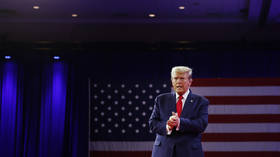The move is likely to delay the former president’s trial schedule by several months
The US Supreme Court has agreed to hear arguments on whether ex-President Donald Trump should enjoy legal immunity in his federal election interference case, putting the trial on hold until justices hand down a ruling.
The court announced the decision on Wednesday, saying it would review whether Trump can face charges for his alleged efforts to overturn the 2020 presidential election. The former commander-in-chief has insisted he is protected by presidential immunity, a claim rejected by federal prosecutors.
Trump hailed the move in a social media post, saying he was “extremely grateful.”
”Without Presidential Immunity, a President will not be able to properly function, or make decisions, in the best interest of the United States of America,” he wrote. “Presidents will always be concerned, and even paralyzed, by the prospect of wrongful prosecution and retaliation after they leave office. This could actually lead to the extortion and blackmail of a President.”
While Trump had asked the justices to pause his trial as the immunity claims were heard by a lower appeals court, they opted to take up the question themselves at the request of Special Counsel Jack Smith, who brought the election-meddling case. Smith has urged justices to speed up the proceeding in an effort to reach a final ruling before the 2024 presidential race, in which Trump is the Republican frontrunner.
Setting an expedited schedule, the court will hear oral arguments starting on April 22 – long after 15 states and one US territory will head to the polls for Super Tuesday. A decision is expected sometime in June, according to the Hill.
Should the court rule against Trump, Smith’s case would be allowed to proceed following months of delays, while a favorable decision would preclude Trump’s prosecution due to legal protections offered to US presidents under certain conditions.
The case marks the first time the nation’s highest court has decided on whether an ex-president should be immune from illegal acts allegedly committed while still in office. Trump, likewise, is the first former commander-in-chief in US history to face criminal charges after leaving the White House.
You can share this story on social media:




